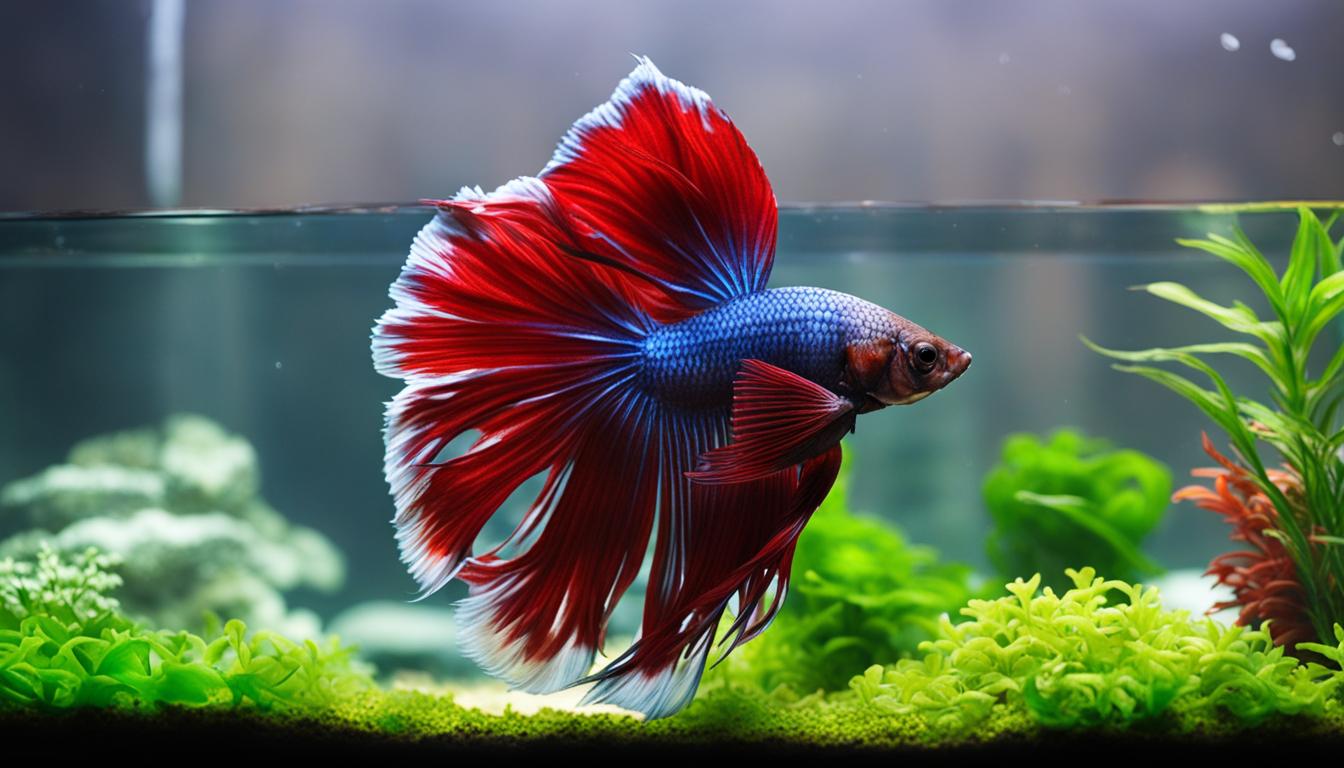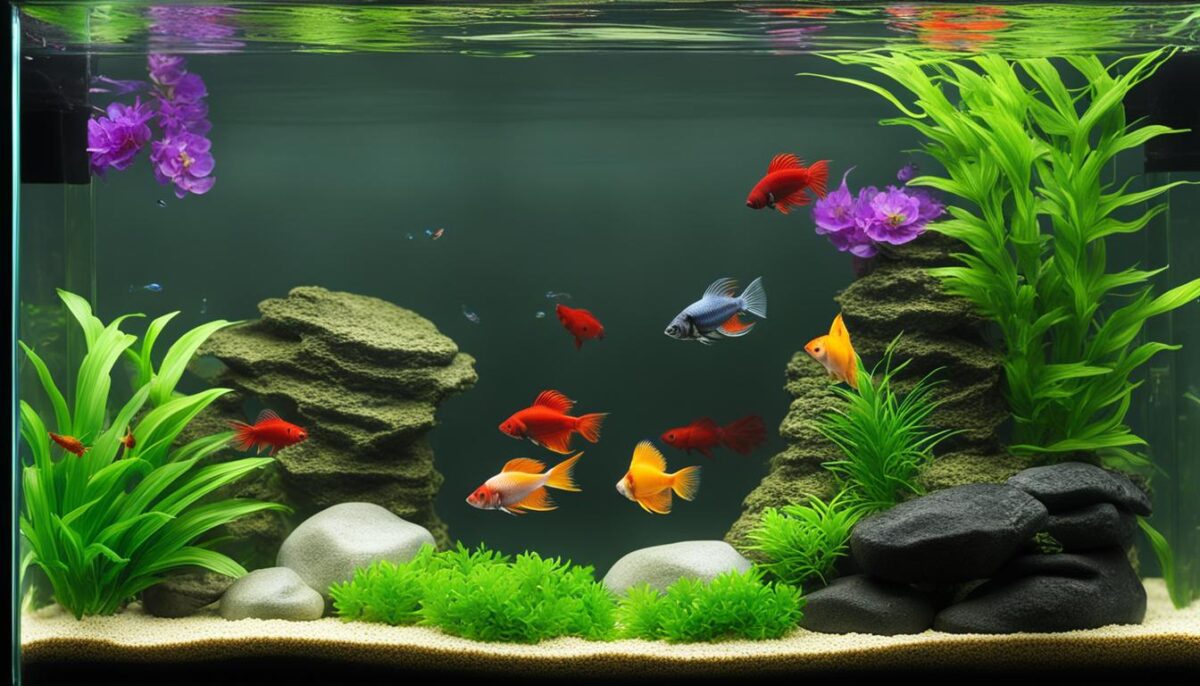Welcome to our guide on betta fish space requirements! If you’re a proud betta fish owner or thinking about getting one, it’s crucial to understand the ideal tank size and space your betta fish needs to thrive. Providing adequate room for your betta fish is essential for their health, happiness, and overall well-being. Let’s dive in and learn more about the space requirements for your betta fish.
Key Takeaways:
- Betta fish need a tank that is no less than 5 gallons in size.
- Smaller bowls or tanks can lead to health issues and a poor quality of life for betta fish.
- A 5-gallon tank provides enough water volume to establish the Nitrogen Cycle easily and maintain water quality.
- Choosing a tank that is at least 5 gallons or larger ensures there is enough swimming space for your betta fish.
Picking the Right Tank Size: Size Matters!
When it comes to choosing a tank for your betta fish, size is an important factor to consider. Unfortunately, many betta fish end up in tiny plastic bowls, which is not suitable for their well-being. To ensure that your betta fish has a healthy and happy life, it’s crucial to provide them with a suitable tank size.
Experts recommend that betta fish should have a tank size of no less than 5 gallons. In fact, the larger the tank, the better it is for your betta fish. Opting for a 5-gallon tank or larger ensures that there is enough water volume to establish the Nitrogen Cycle easily and maintain water quality.
Choosing a tank that is at least 5 gallons or larger provides your betta fish with adequate space to swim and thrive. It’s important to remember that betta fish have a natural instinct to explore their surroundings and need room to exercise their fins. A larger tank also provides them with more oxygen and reduces the risk of stagnant water.
By investing in a suitable tank size, you are prioritizing the well-being of your betta fish and providing them with optimal living conditions. Betta fish are known for their vibrant colors and graceful movements, and a spacious tank allows them to showcase their beauty.
As you continue to read the article, you’ll discover other essential accessories that complement the ideal tank size for betta fish. These accessories further enhance the overall environment and ensure your betta fish’s health and happiness.
Essential Tank Accessories for Betta Fish
In addition to providing your betta fish with an appropriate tank size, there are essential accessories that you need to consider. These accessories will help create a comfortable and stimulating environment for your betta fish.
Betta Fish Filter
A betta fish filter is a crucial accessory to maintain a clean and healthy tank. Filters help remove harmful bacteria and debris from the water, ensuring optimal water quality. When choosing a filter for your betta fish tank, it is important to opt for a gentle filter that won’t create strong currents. Strong currents can make it difficult for bettas to swim comfortably. Look for a filter with adjustable flow settings to create ideal water currents for your betta fish.
Betta Fish Heater
Betta fish are native to tropical waters, so it is essential to provide them with a stable and warm environment. A betta fish heater helps maintain the water temperature between 78-80 degrees Fahrenheit, which is ideal for betta fish health and well-being. It is recommended to use a separate thermometer to monitor the temperature accurately and ensure it remains within the appropriate range.
Betta Fish Tank Accessories
In addition to a filter and heater, there are other accessories that will enhance your betta fish’s habitat. Suitable gravel, plants for hiding spots, and decorations not only add aesthetic appeal to the tank but also provide physical and mental stimulation for your betta fish. Gravel can create a natural substrate for the tank, while live or artificial plants offer hiding spots and play areas for your betta fish. Decorations such as caves or small structures can also provide additional places for your fish to explore and feel secure.
By providing your betta fish with these essential tank accessories, you can ensure their overall well-being and happiness in their aquatic home.
Conclusion
Creating a suitable environment for your betta fish is essential for their health and happiness. One of the most crucial aspects of this is selecting the right tank size. Your betta fish needs a tank that provides adequate swimming space, so a minimum of 5 gallons is recommended. This size allows your betta fish to move freely and engage in natural behaviors.
In addition to tank size, there are other important factors to consider. A filter is necessary to keep the tank clean and maintain water quality. Be sure to choose a gentle filter that won’t create strong currents that can stress out your betta fish. A heater is also essential to maintain the water temperature in the optimal range of 78-80 degrees Fahrenheit.
Furthermore, don’t forget to provide your betta fish with suitable gravel, plants, and decorations. These items not only enhance the aesthetics of the tank but also create a stimulating and comfortable environment for your betta fish. They offer hiding spots and opportunities for exploration, which are important for their well-being.
By following these guidelines and providing your betta fish with the space and accessories they need, you can ensure that they thrive in their tank. Remember to regularly monitor and maintain water quality through water changes and proper care. With a well-planned betta fish tank setup, you can create a safe and enjoyable home for your fish.
FAQ
What is the ideal tank size for a betta fish?
The ideal tank size for a betta fish is no less than 5 gallons.
Why is a 5-gallon tank recommended for betta fish?
A 5-gallon tank provides enough water volume to establish the Nitrogen Cycle easily and maintain water quality. It also ensures that betta fish have enough space to swim and thrive.
Can I keep my betta fish in a small bowl or tank?
It is not recommended to keep betta fish in small bowls or tanks as they require adequate swimming space. Smaller bowls or tanks can lead to health issues and a poor quality of life for bettas.
What accessories do I need for my betta fish tank?
Betta fish require a filter to keep the tank clean and reduce harmful bacteria. They also need a heater to maintain the water temperature between 78-80 degrees Fahrenheit. Suitable gravel, plants, and decorations are also essential for creating a stimulating and comfortable environment.
What type of filter should I choose for my betta fish tank?
It is important to choose a gentle filter that won’t create strong currents which could be difficult for bettas to swim in. A filter with adjustable flow settings is ideal for creating optimal water currents.
Why do betta fish need a heater in their tank?
Betta fish originate from tropical waters and need a heater to maintain the water temperature between 78-80 degrees Fahrenheit, which is essential for their health and well-being.
What other accessories are essential for a betta fish tank?
Other accessories such as suitable gravel, plants for hiding spots, and decorations are important for creating a stimulating and comfortable environment for your betta fish.
How can I ensure the well-being of my betta fish in their tank?
Ensuring the well-being of your betta fish includes choosing a tank size of no less than 5 gallons to provide adequate swimming space, using a filter to keep the tank clean, a heater to maintain the right temperature, and suitable gravel, plants, and decorations for enrichment.
How should I monitor and maintain the water quality in my betta fish tank?
You can monitor and maintain water quality in your betta fish tank through regular water changes and proper care. Monitoring the temperature using a separate thermometer is also crucial.

